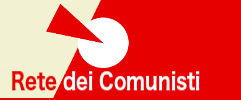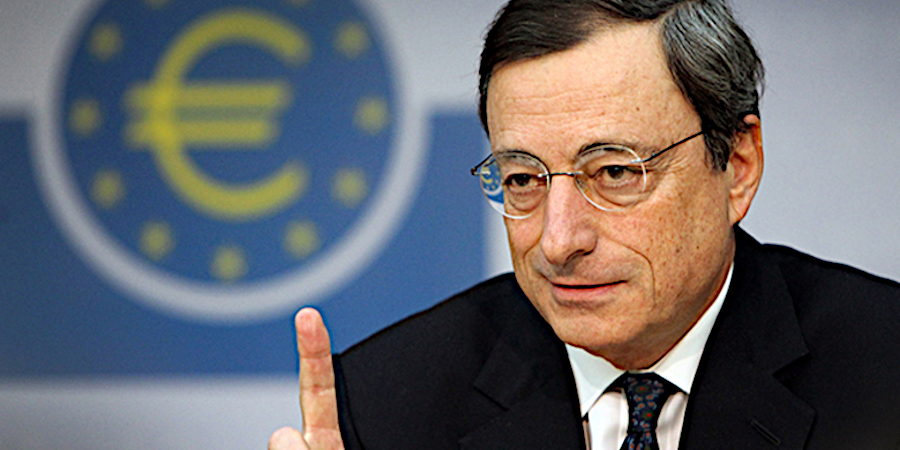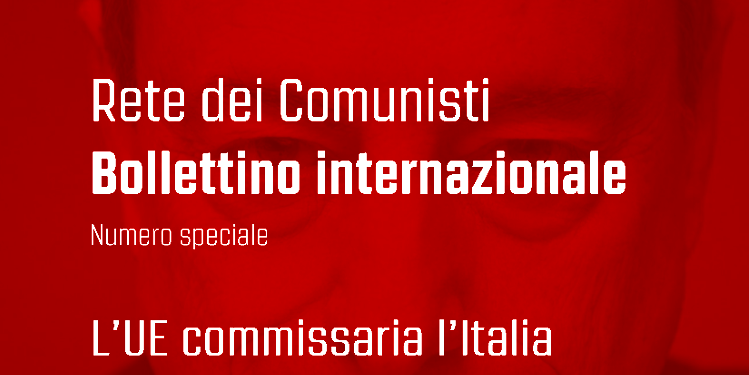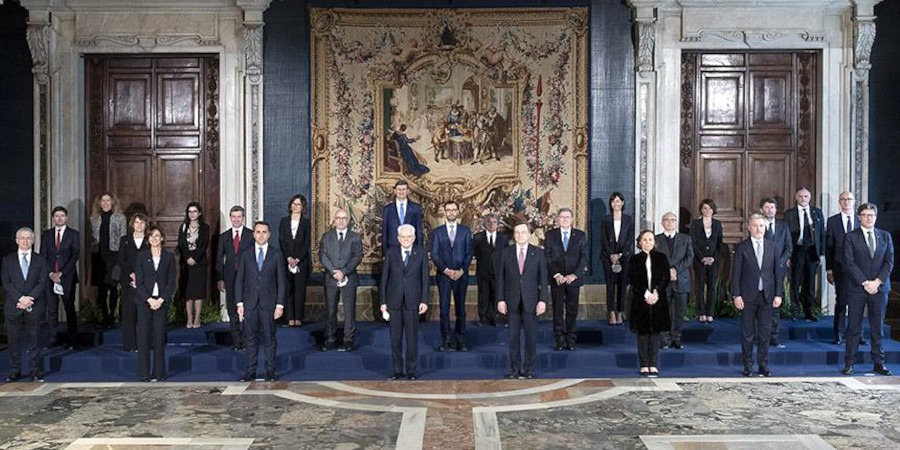| english | español | français | italiano |
Mauro Casadio – Rete dei Comunisti
We finally got there. Mario Draghi is the President of the Council of Ministers and, after having boarded the ministers of all parties, he is ready to be sanctified by being elected President of the Republic next year.
Indeed, “Super Mario” seems to have worked a miracle by converting “the wolf” Matteo Salvini into a convinced pro-European and confirming the Five Star Movement (M5S) in its role as a responsible force. Its leader, Beppe Grillo, in fact, has gone from wanting to open Parliament like a can of tuna to being the tuna himself.
Draghi saviour of the homeland! But of what country? Perhaps there is a misunderstanding here: the homeland to be saved for the former president of the ECB is the European Union and certainly not an Italy that shows an indecent political class, of which Matteo Renzi is only the “champion” par excellence and indecency.
This is just the proscenium of the current political farce, which is obsessively fed to us daily by newspapers and the media for whom the central problem is to find the man of salvation.
On the other hand, the fact that we are in a farce was made clear by President of the Republic, Sergio Mattarella, when he gave the exploratory mandate to Roberto Fico, President of the Chamber of Deputies, knowing perfectly well that “the sniper” Renzi would take aim and shoot on behalf of third parties. Well knowing already which alternative to propose immediately afterwards.
This is the “tree” that we are told about, but everyone pretends nothing about the “forest”, i.e. no one tells us that the prospects of our country – but this at least since 2011 with the famous Draghi-Trichet letter – are certainly not decided in Rome, but in the rooms of the bureaucratic apparatus of the European Union and the continental financial and economic potentates that determine the real policies
A straggling Italy, as a founding member of the EU and given its not inconsiderable size, also undermines EU action, the main problem of which is global competition with other imperialist countries and an emerging economic power such as China.
This is the crux of the problem, since keeping up with the competition in a general condition of economic backwardness produced by the Covid affair, and in any case of limited world growth, means reorganising the different competitive areas internally “one against the other armed”.
This concerns the production and financial plan, the labour and social plan, and the political-institutional plan where necessary. And this is precisely the case of our country, which should be placed under commission, no more and no less, as was done in Greece at the beginning of the 2010s on the issue of debt.
Without going into too much detail on the characteristics of the new phase, it should be noted that these are becoming increasingly evident on an institutional level, with a series of “reforms”, tax, justice, digitalisation, public administration, etc., but above all with an increasingly close and functional relationship between our production and finance with the strong centres of the EU.
Hence the reorganisation and rationalisation of production chains, which tend to be centralised and recomposed within the European area and in neighbouring geographical areas
Financial reorganisation, with the birth of a common debt that not only has to support economic recovery but also becomes competitive with US bonds on the international financial market.
Social reorganisation, which no longer concerns only the salaried sectors but also all those service and tertiary activities that have entered into crisis with the pandemic, which is favouring the role of multinationals in movement and services.
This is throwing a large part of the country, on which the national economy has relied since the days of the Christian Democrats, onto the street, with the multiplication of ‘small traders’ in an anti-communist function.
We are clearly at a quantum leap in the EU, which is once again made possible by a crisis: in 2008 by the financial crisis and today by the Covid crisis. The conditions are thus created to break through national resistance (including that of Germany) and to redesign the social classes in the European space, both with regard to the bourgeoisie, where there is a clear division of perspectives within it, and with regard to the proletariat and the subordinate classes.
Especially those of the Mediterranean countries, which are being penalised the most and are increasingly playing the role of the first periphery of what we can call a Carolingian Europe.
This process of leaps and bounds and crises should be borne in mind because it will continue to manifest itself in this form in the future: it has long been theorised by an ideologue of the EU called Romano Prodi, who has made it clear in several interviews and articles that crises are the instrument on which to build the Union.
No more and no less, we say, than wars have been the instrument for building nation states at other times in history; the peaceful outcome of such a ‘global’ process is certainly not a foregone conclusion.
Step by step they are building what we, as the Rete dei Comunisti, have been defining for some time as the European Imperialist Pole in ways, times and forms that are historically unprecedented, but which are closely linked to the dynamics of the Capitalist Mode of Production, inevitably projected towards its modern imperialist evolution
This dynamic is pervasive, it does not only concern structural data but also invests other dimensions, from the ideological to the political one, up to the redefinition of national institutions in function of community ones.
It is on this level that the present political crisis should be read: Renzi is obnoxious, Conte is a good person, Draghi is the saviour of the country… but no event is correctly interpretable if we continue to abstract ourselves from the EU “forest”.
So, the political crisis should be seen as a crisis of an indecent political class, but which is not in itself the absolute evil, as it is “only” the product of a historically subaltern bourgeoisie, without planning capacity and often servile, as it was during the cold war towards the USA.
In short, a ruling class and certainly not a managerial one, which today has entered into the redesign of the EU that leaves behind not only dependent labour, the subordinate classes and destroys the welfare state, as the pandemic has amply demonstrated, but is preparing to throw overboard that small and medium “entrepreneurial” bourgeoisie and the parasitic classes that have been the social base of an essentially reactionary and anti-communist Italy, but which is now no longer needed to support the competition to which the EU is called.
This “millstone” will produce its structural effects over time, but those on the national political framework are immediate. Since the previous crisis, which took shape with the Monti government in 2011, the class contradictions and spurious contradictions of our social system have manifested themselves with two new phenomena: the main one, the birth of the M5S as a strongly conflicting subject towards the political-institutional set-up, starting with Berlusconi; and that of Matteo Salvini’s Liga, projected onto the national level in an attempt to overcome the Northern origin of the Liga Nord.
The current leap produced by the Pandemic and the rebalancing of international forces has overcome the previous condition by redesigning, under the aegis of the EU, the country’s political forces, alliances and institutional set-up, as happened with the cut in the number of MPs brought about precisely by the new political forces.
The lowering of the M5S’s head to the financial power, which they have always denounced, and the return to the Northern League, as the representative of small and medium-sized enterprises, which are inextricably linked to the German “locomotive”, are the reduction to which the populist and sovereignist forces that have so terrified the good democrats of our country, obviously of the left, have arrived.
Draghi’s miracle was precisely that of having grasped the ripe fruit, or rotten fruit depending on one’s point of view, of a blocked political system, in which the no longer new forces called upon to govern the country have shown all their inconsistency, failing to emancipate the social sectors they represent from their subordination to the great Italian bourgeoisie in the process of integration with the European one.
This missed – but from the communists’ point of view impossible – emancipation does not take place within a recovery produced by economic growth, but within the most difficult and deepest crisis that the West has ever known after the Second World War. Therefore it is not difficult to argue that the crisis of the previous “heterodox” representations accentuates the multiple contradictions in action, and this reopens in a not very long time the knot of the political representation of the subaltern social sectors.
In this analysis we cannot avoid a quick comment on the role of the PD, and of the left wing of LeU and the like, which, having accepted the hegemony of the adversary, have limited themselves to floating in the political picture, acting as spectators and playing second fiddle to the contradictions of the others. Even if, it must be said, with a more shrewd Zingaretti secretariat, they were only dwarfs on the shoulders of the EU ‘giant’. On whose shoulders the 5Stelle are going to aggregate, as well as the now exhausted Italian left, in a potential “democratic” political pole.
The struggle against (or rather the breaking up of) the EU and the political representation of the subordinate classes are questions that have not been overcome and that are now being reproposed with the stubbornness of facts, in the conditions that are emerging from the profound crisis of the system and of hegemony that the bourgeois ideological apparatuses are trying to hide but which is increasingly evident, despite the attempts at mystification.
A crisis of hegemony that re-proposes the relevance of Socialism within the contradictions of the present social model, as Cuban and Chinese aid to our health system has suddenly and unexpectedly revealed, precisely in the regions of health “excellence” in the North
For a long time the Rete dei Comunisti has been arguing, theoretically, politically and analytically, that these are the points on which the class left can make a qualitative leap, breaking the stagnation and relaunching the political and social conflict in the country. It is certainly no coincidence that it is precisely on these two elements that the institutional and party crises are centred. Nor certainly can the fascists of Fratelli d’Italia stand as candidates to take up the legacy of reactionary “rupture” that first Berlusconi and then Salvini have attempted to represent.
In the clarity of the high political references, from the denunciation of the role of the EU to the actuality of Socialism, it is necessary to work for the construction of a front of forces representative of the social and political crisis. Including the contradiction that the M5S is going through, which seems to be able to produce fractures at the top of the movement but certainly produces them at its base, 40% of which voted against Draghi.
The Rete dei Comunisti intends to promote its own political initiative in this sense, in all possible fora. Since we are convinced that the reality we are facing must also be interpreted in its intimate dynamics, we want to open in the coming weeks with a wide-ranging forum, a phase of in-depth analysis on the characteristics of the current transition that, as we have repeatedly stated, has the depth of history.




